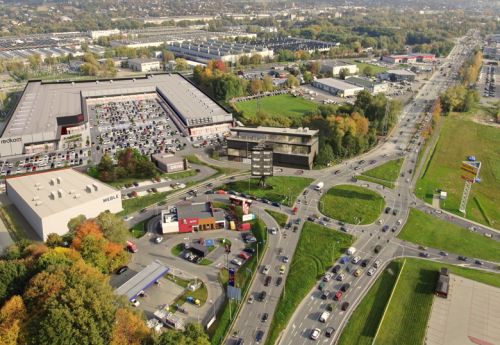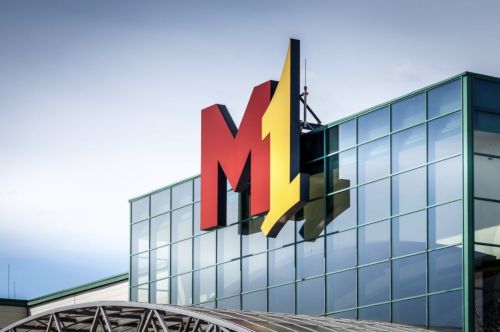New technology
Interior DesignUS luxury department store chain Nordstrom and US fashion designer and retailer Rebecca Minkoff have decided to install internet-connected and RFID-supported mirrors developed by EBay in their stores. Company representatives have told ‘Eurobuild CEE’ that Nordstrom, which currently operates app. 250 stores across the country, will use the smart mirrors in two locations, while Rebecca Minkoff will install the devices in its newly-opened New York flagship store. The devices will come in two formats: the Connected Glass shopping wall, a large mirror that allows customers to browse the product catalogue, match products, view product recommendations and ask a virtual shopping assistant, and smaller mirrors designed for the fitting rooms. The latter will be able to automatically recognise items in the fitting room by their RFID tags and also identify online registered shoppers (if they enter their phone numbers). They will inform customers about product availability in-store and online, available colours and sizes, and even allow them to quickly make their transactions. This cutting-edge technology also aims to help store managers and assistants to improve the monitoring and managing of their inventories. Ebay is now working on adding other features to its smart mirrors, including product ratings and reviews. “There are ‘pain points’ in the shopping experience in traditional retail that I wanted to address. I wanted to (…) continue the conversation with our shoppers in the same direct line of communication I have with them online. More than anything, though, I wanted the experience to be easy… like being able to ask an associate for another size by simply touching the screen on our dressing room’s ‘magic mirror’,” says Rebecca Minkoff, the brand’s creative director. Its new store will also feature a ‘Check-in Upon Arrival’ – a mobile phone app that allows the shopper’s personal profile to be carried across all the store’s channels.
Rope-free elevator revolution?
German steel supplier ThyssenKrupp has developed a rope-free elevator system. The company has used linear motors in elevator cabins and horizontal shaft-changing cabin systems to transform conventional elevator transportation model into a metro-like system. The Multi elevator technology aims to increase transport capacities and efficiency while reducing the elevator footprint and peak loads from the power supply in urban buildings. Similarly to a metro system operation, the Multi design can incorporate various self-propelled elevator cabins for each shaft running in a loop. The company’s engineers believe that several cabins in the same shaft moving vertically and horizontally will permit buildings to adopt different heights, shapes and purposes. Multi requires smaller shafts than conventional elevators, and can increase a building’s usable area by up to 25 pct, says the company. ThyssenKrupp also stresses that although the ideal building height for the rope-free lightweight elevator installations starts at 300m, the system is not constrained by a building’s height. The first Multi elevator unit is set to be in tests by 2016.
Holographic videoconferences from hotel chain
Spanish hotelier NH Hotel Group has launched an innovative videoconferencing system that enables 3D holographic projections and real-time collaborative communications. The chain has permanently installed 3D holographic videoconference sets in the meeting rooms in two of its hotels, in Madrid and Berlin. Now the company will be pilot-testing holographic transmissions in the two locations. The apparatus comes as part of the newly-developed High Tech Made Easy service designed to improve the quality of meetings and events held in NH hotels. “This move makes NH Hotel Group the first hotel chain in the world to implement this revolutionary hotel system, which enables impressive holographic presentations and live videoconferences by connecting up two or more hotel locations,” NH Hotel Group has announced. Meanwhile, the company’s other hotels will be equipped with the Smart Room System for Microsoft Lync online videoconferencing systems, capable of 250-attendee video calls. NH runs an in-house technology hub, Living Lab Hotel, in one of its Madrid hotels.
Skanska tests 3D concrete printing
Swedish construction and development giant Skanska has teamed up with a British university to develop the use of 3D printing in the construction industry. The partnership aims to develop the world’s first commercial concrete printing robot that would revolutionise the construction process and supply chain. As part of the agreement, Skanska will use the 3D concrete printing technology developed by researchers from Loughborough University in its construction projects over the next 18 months. A team of The School of Civil and Building Engineering scholars, who have been working on 3D concrete printing technology for construction since 2007, have now built 3D concrete printers fitted to gantries and robotic arms. “The printer deposits high–performance concrete under precise computer control. It works by producing successive layers of concrete until the entire object is created,” the University explains. Skanska will be using the 3D printers to make concrete construction elements that cannot be manufactured by traditional methods: complex structural components, curved cladding panels and architectural features. “3D concrete printing, when combined with a type of mobile prefabrication centre, has the potential to reduce the time needed to create complex elements of buildings from weeks to mere hours,” said Rob Francis, Skanska’s director of innovation and business improvement.
Amazon’s robot army
Amazon has come up with yet another idea on how to speed up and save on the fulfilment process. The US giant has rolled out a fleet of 15,000 robots that will replace human “pickers” across its ten newly opened hi-tech US distribution hubs. The company’s “eighth generation fulfilment centres” will use the small wheeled Kiva robots as well as large standalone Robo-Stow robotic arms, together with a range of other new technological devices, to pick, pack and ship orders quicker and cheaper than traditionally. The battery-powered Kiva mobile bots are designed to rapidly locate and pick-up portable storage units (cartons, pallets, movable shelves etc.) that contain the products needed for fulfilling an order, bringing them to the personnel who sort the orders [see photo above]. The devices were developed by Kiva Systems, a robotics technology provider acquired by Amazon in 2012. “Amazon has used automation in its fulfilment centres for some time now, and Kiva’s technology is another way to improve productivity by bringing the products directly to the employees to pick, pack and stow,” Dave Clark, the vice-president of global customer fulfilment at Amazon, said at the time. Kiva Systems solutions are also being used by such retailers as Gap, Walgreens, Staples, Office Depot and Saks 5th Avenue. The e-commerce giant will also use the massive Robo-Stow arms to move large quantities of products around the warehouse. Amazon currently operates over 100 fulfilment centres worldwide (app. 60 are located in the US and 30 in Europe, including four in the CEE region). In its newly-launched distribution hubs Amazon will also introduce new vision systems to enable the quick unloading and delivery of the massive trailers of products.
Linking in with Marriott and MIT
Hotel giant Marriott has joined forces with the researchers of the Massachusetts Institute of Technology to develop Six Degrees, an app-based social and business networking system that allows hotel guests to find and meet their future business partners as well as old work and university friends staying at Marriott hotels. The app employs the user’s LinkedIn profile to match guests with one another based on what they have in common, whether this is business or social history. “Through Six Degrees, guests can discover how they are connected to each another, and can socialise with one another in events planned by Marriott,” explains the MIT Mobile Experience Lab, which leads the project. To facilitate the face-to-face meetings and help with the sometimes difficult lobby socialising, the researchers have also designed a special, tech-filled lobby table. Activated by a guest’s mobile device or key card, the table signals when guests seated at the same table have something in common (at least in LinkedIn terms), the researchers say. In addition, the match-making hotel system is complemented with a public display, also designed for the hotel lobby, that shows details on upcoming events and other users’ activity.
Bedtime stories from far, far away
Marriott-operated hotel chain Residence Inn has teamed up with education media publisher Cricket Media to help business travellers stay connected with their children. A collaborative reading app developed by Cricket Media, Story Bug, allows kids and their parents – or other relatives – to read stories together in real-time with the help of video chat, an interactive reader and a collection of digital books. While reading the goodnight story, children and adults can see and hear each other while viewing the same digital book. They can also share the controls for turning pages and interacting with the content. Story Bug users will also have access to Residence Inn-branded travel-themed books. “We understand how difficult it is for parents who have to travel for work to maintain their daily routines with their children, especially in the evening before bedtime,” explained Diane Mayer, the vice-president and global brand manager of Residence Inn.





















































